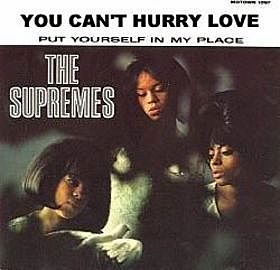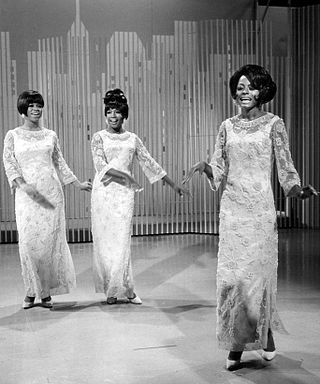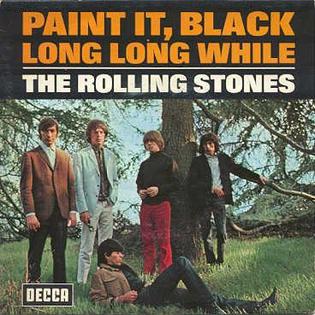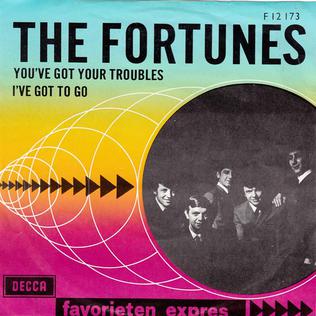Related Research Articles

"You Can't Hurry Love" is a 1966 song originally recorded by the Supremes on the Motown label. It was released on July 25 of 1966 as the second single from their studio album The Supremes A' Go-Go (1966).

American girl group The Supremes have released 29 studio albums, four live albums, two soundtrack albums, 32 compilation albums, four box sets, 66 singles and three promotional singles. The Supremes are the most successful American group of all-time, and the 26th greatest artist of all time on the US Billboard charts; with 12 number-one songs on the Billboard Hot 100 and three number-one albums on the Billboard 200. The Supremes were the first artist to accumulate five consecutive number-one singles on the US Hot 100 and the first female group to top the Billboard 200 albums chart with The Supremes A' Go-Go (1966). In 2017, Billboard ranked The Supremes as the number-one girl group of all-time, publishing, 'although there have been many girl group smashes in the decades since the Supremes ruled the Billboard charts, no collective has yet to challenge their, for lack of a better word, supremacy.' In 2019, the Official Charts Company placed 7 Supremes songs—"You Can't Hurry Love" (16), "Baby Love" (23), "Stop! In The Name Of Love" (56), "Where Did Our Love Go?" (59), "You Keep Me Hangin' On" (78), "Come See About Me" (94) and "Stoned Love" (99)—on The Official Top 100 Motown songs of the Millennium chart, which ranks Motown releases by their all-time UK downloads and streams.

"I'm a Believer" is a song written by Neil Diamond and recorded by the Monkees in 1966 with the lead vocals by Micky Dolenz. The single, produced by Jeff Barry, hit the number-one spot on the U.S. Billboard Hot 100 chart for the week ending December 31, 1966, and remained there for seven weeks, becoming the last No. 1 hit of 1966 and the biggest-selling single for all of 1967. Billboard ranked the record as the No. 5 song for 1967. While originally published by Screen Gems-Columbia Music (BMI), it is now published by Stonebridge Music/EMI Foray Music (SESAC), with administration passed to Sony/ATV Music Publishing and Universal Music Publishing Group.

"Paint It Black" is a song recorded in 1966 by the English rock band the Rolling Stones. A product of the songwriting partnership of Mick Jagger and Keith Richards, it is a raga rock song with Indian, Middle Eastern, and Eastern European influences and lyrics about grief and loss. London Records released the song as a single on 7 May 1966 in the United States, and Decca Records released it on 13 May in the United Kingdom. Two months later, London Records included it as the opening track on the American version of the band's 1966 studio album Aftermath, though it is not on the original UK release.

Hot Country Songs is a chart published weekly by Billboard magazine in the United States.
"A Groovy Kind of Love" is a song written by Toni Wine and Carole Bayer Sager based on a melody by the classical composer Muzio Clementi.

"Get Together", also known as "Let's Get Together" and "Everybody Get Together", is a song by American rock band the Youngbloods, originally included in their 1967 debut album The Youngbloods. It was written in the mid-1960s by American singer-songwriter Chet Powers, from psychedelic rock band Quicksilver Messenger Service. The single was The Youngbloods' only Top 40 on Billboard Hot 100—peaking at number five in 1969.
"(There's) Always Something There to Remind Me" is a song by songwriting team Burt Bacharach and Hal David. Originally recorded as a demo by Dionne Warwick in 1963, "(There's) Always Something There to Remind Me" first charted for Lou Johnson, whose version reached No. 49 on the Billboard Hot 100 in the summer of 1964. Sandie Shaw took the song to No. 1 in the UK that same year, while the duo Naked Eyes had a No. 8 hit with the song in the US two decades later in 1983.
"Long Live Love" is a Chris Andrews composition which, in 1965, gained Sandie Shaw the second of her three UK number one hit singles.

"Woman in Love" is a song performed by Barbra Streisand and taken from her 1980 album, Guilty. The song was written by Barry and Robin Gibb of the Bee Gees, who received the 1980 Ivor Novello award for Best Song Musically and Lyrically. It is her fourth of four Platinum records, and is considered her greatest international hit.

"You've Got Your Troubles" became the inaugural composition by the prolific songwriting team of Roger Cook and Roger Greenaway in 1964. "You've Got Your Troubles" became a number 2 UK hit for the Fortunes in the United Kingdom in August 1965, affording the group international success including a Top Ten ranking in the US. The track was included on the Fortunes' self-titled 1965 debut album release, the group's only album release of the 1960s.

"I Want You" is a song recorded by Bob Dylan in 1966. Recorded in the early morning hours of March 10, 1966, the song was the last one recorded for Dylan's double-album Blonde on Blonde. It was issued as a single that June, shortly before the release of the album.

This article contains information about albums and singles released by Ike & Tina Turner.
References
- ↑ January 18, 1964 issue of Billboard Magazine; page 61 (Retrieved 2016-01-24)
- ↑ "Billboard Hits of the World". 9 January 1965. Retrieved 8 September 2018.
- ↑ "Billboard Hits of the World". 16 January 1965. Retrieved 8 September 2018.
- ↑ "Billboard Hits of the World". 23 January 1965. Retrieved 8 September 2018.
- ↑ "Billboard Hits of the World". 30 January 1965. Retrieved 8 September 2018.
- ↑ "Billboard Hits of the World". 6 February 1965. Retrieved 8 September 2018.
- ↑ "Billboard Hits of the World". 6 February 1965. Retrieved 8 September 2018.
- ↑ "Billboard Hits of the World". 20 February 1965. Retrieved 8 September 2018.
- ↑ "Billboard Hits of the World". 27 February 1965. Retrieved 8 September 2018.
- ↑ "Billboard Hits of the World". 6 March 1965. Retrieved 8 September 2018.
- ↑ "Billboard Hits of the World". 13 March 1965. Retrieved 8 September 2018.
- ↑ "Billboard Hits of the World". 20 March 1965. Retrieved 8 September 2018.
- ↑ "Billboard Hits of the World" . Retrieved 8 September 2018.
- ↑ "Billboard Hits of the World" . Retrieved 8 September 2018.
- ↑ "Billboard Hits of the World" . Retrieved 8 September 2018.
- ↑ "Billboard Hits of the World" . Retrieved 8 September 2018.
- ↑ "Billboard Hits of the World" . Retrieved 8 September 2018.
- ↑ "Billboard Hits of the World" . Retrieved 8 September 2018.
- ↑ "Billboard Hits of the World" (PDF). Retrieved 19 April 2019.
- ↑ "Billboard Hits of the World" . Retrieved 8 September 2018.
- ↑ "Billboard Hits of the World" . Retrieved 10 September 2018.
- ↑ "Billboard Hits of the World" . Retrieved 10 September 2018.
- ↑ "Billboard Hits of the World" . Retrieved 10 September 2018.
- ↑ "Billboard Hits of the World" . Retrieved 10 September 2018.
- ↑ "Billboard Hits of the World" . Retrieved 10 September 2018.
- ↑ "Billboard Hits of the World" . Retrieved 10 September 2018.
- ↑ "Billboard Hits of the World" . Retrieved 10 September 2018.
- ↑ "Billboard Hits of the World" . Retrieved 10 September 2018.
- ↑ "Billboard Hits of the World" . Retrieved 10 September 2018.
- ↑ "Billboard Hits of the World" . Retrieved 10 September 2018.
- ↑ "Billboard Hits of the World" . Retrieved 10 September 2018.
- ↑ "Billboard Hits of the World" . Retrieved 10 September 2018.
- ↑ "Billboard Hits of the World" . Retrieved 10 September 2018.
- ↑ "Billboard Hits of the World" . Retrieved 10 September 2018.
- ↑ "Billboard Hits of the World" . Retrieved 10 September 2018.
- ↑ "Billboard Hits of the World" . Retrieved 10 September 2018.
- ↑ "Billboard Hits of the World" . Retrieved 10 September 2018.
- ↑ "Billboard Hits of the World" . Retrieved 10 September 2018.
- ↑ "Billboard Hits of the World" . Retrieved 10 September 2018.
- ↑ "Billboard Hits of the World". 13 November 1965. Retrieved 10 September 2018.
- ↑ "Billboard Hits of the World". 20 November 1965. Retrieved 10 September 2018.
- ↑ "Billboard Hits of the World". 27 November 1965. Retrieved 10 September 2018.
- ↑ "Billboard Hits of the World" . Retrieved 10 September 2018.
- ↑ "Billboard Hits of the World (p. 30)" (PDF). Retrieved 10 September 2018.
- ↑ "Billboard Hits of the World". 18 December 1965. Retrieved 10 September 2018.
- ↑ "Billboard Hits of the World". January 1966. Retrieved 10 September 2018.
- ↑ Their version of the song was titled "Bule Bule".